Heptagram
A heptagram, septagram, septegram or septogram is a seven-point star drawn with seven straight strokes.
| Regular heptagram (7/2) | |
|---|---|
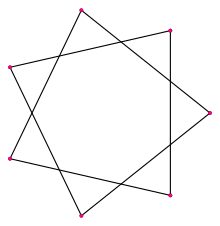 A regular heptagram | |
| Type | Regular star polygon |
| Edges and vertices | 7 |
| Schläfli symbol | {7/2} |
| Coxeter diagram | |
| Symmetry group | Dihedral (D7) |
| Internal angle (degrees) | ≈77.143° |
| Dual polygon | self |
| Properties | Star, cyclic, equilateral, isogonal, isotoxal |
| Regular heptagram (7/3) | |
|---|---|
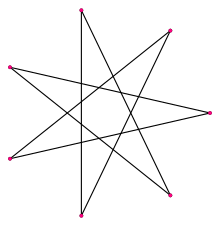 A regular heptagram | |
| Type | Regular star polygon |
| Edges and vertices | 7 |
| Schläfli symbol | {7/3} |
| Coxeter diagram | |
| Symmetry group | Dihedral (D7) |
| Internal angle (degrees) | ≈25.714° |
| Dual polygon | self |
| Properties | Star, cyclic, equilateral, isogonal, isotoxal |
| Star polygons |
|---|
|
|
The name heptagram combines a numeral prefix, hepta-, with the Greek suffix -gram. The -gram suffix derives from γραμμῆ (grammē) meaning a line.[1]
Geometry
In general, a heptagram is any self-intersecting heptagon (7-sided polygon).
There are two regular heptagrams, labeled as {7/2} and {7/3}, with the second number representing the vertex interval step from a regular heptagon, {7/1}.
This is the smallest star polygon that can be drawn in two forms, as irreducible fractions. The two heptagrams are sometimes called the heptagram (for {7/2}) and the great heptagram (for {7/3}).
The previous one, the regular hexagram {6/2}, is a compound of two triangles. The smallest star polygon is the {5/2} pentagram.
The next one is the {8/3} octagram and its related {8/2} star figure (a compound of two squares), followed by the regular enneagram, which also has two forms: {9/2} and {9/4}, as well as one compound of three triangles {9/3}.
 {7/2} |
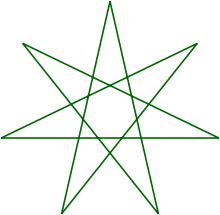 {7/3} |
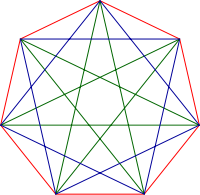 {7}+{7/2}+{7/3} |
 7-2 prism |
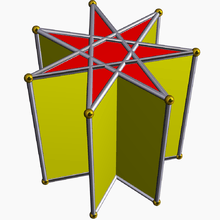 7-3 prism |
 Complete graph |
 7-2 antiprism |
 7-3 antiprism |
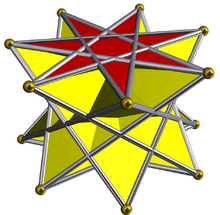 7-4 antiprism |
Uses
Flags and heraldry
 Former Georgian coat of arms, 1918–1921, 1991–2004
Former Georgian coat of arms, 1918–1921, 1991–2004 Roundel of the Georgian Air Force
Roundel of the Georgian Air Force Flag of Eastern Band Cherokee
Flag of Eastern Band Cherokee.svg.png) The seven-pointed star of the Felibritge on the Occitan flag.
The seven-pointed star of the Felibritge on the Occitan flag. The Jordanian flag, bearing the star that symbolizes Al-Fatiha
The Jordanian flag, bearing the star that symbolizes Al-Fatiha Symbol of Hokkaido
Symbol of Hokkaido Coat of arms of Samarkand
Coat of arms of Samarkand Commonwealth Star as the crest of Coat of Arms of Australia
Commonwealth Star as the crest of Coat of Arms of Australia
- The seven-pointed star is incorporated into the flags of various bands of Cherokee Indians and the badges of Navajo Nation Police (as well as other police).
- The Bennington flag, a historical American Flag, has thirteen seven-pointed stars along with the numerals "76" in the canton.
- The Flag of Jordan contains a seven-pointed star.
- The Flag of Australia employs five heptagrams and one pentagram to depict the Southern Cross constellation and the Commonwealth Star.
- Some old versions of the coat of arms of Georgia (country) including the Georgian Soviet Socialist Republic used the {7/2} heptagram as an element.
- A seven-pointed star is used as the badge in many sheriff's departments and some smaller-community police departments.
Law enforcement
 Seal of the California Highway Patrol
Seal of the California Highway Patrol
Religious and occult symbolism
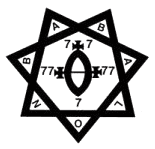
- The heptagram was used in Christianity to symbolize the seven days of creation and became a traditional symbol for warding off evil. The symbol is used in some Christian sects such as Catholicism and Orthodox Christianity.
- The symbol is also used in Kabbalist Judaism.
- In Islam, the heptagram is used to represent the first seven verses in the Quran.
- The heptagram is used in the symbol for Babalon in Thelema.
- The heptagram is known among neopagans as the Elven Star or Fairy Star. It is treated as a sacred symbol in various modern pagan and witchcraft traditions. Blue Star Wicca also uses the symbol, where it is referred to as a septegram. The second heptagram is a symbol of magical power in some pagan spiritualities.
- In alchemy, a seven-sided star can refer to the seven planets which were known to early alchemists.
- In Polynesia, the seven-pointed star is used often in imagery, basket making, tattoos, and is considered to be a symbol of Kanaloa, the first Polynesian navigator. [2]. [3]
In popular culture

- The logo of american shoe brand DC Shoes features a 7/3 heptagram in the letter C.
- The seven-pointed star is used as the logo for the international Danish shipping company A.P. Moller–Maersk Group, sometimes known simply as Maersk.
- In George R. R. Martin's novel series A Song of Ice and Fire and its TV version Game of Thrones, a seven-pointed star serves as the symbol of the Faith of the Seven.
- Progressive metal band Tool uses the heptagram in their art and visuals as a symbol of positive energy and openness.
- In the manga series MeruPuri, a magical mirror/ portal is in the shape of a heptagram. The symbol is also seen during spellcasting.
- Finnish rock band HIM used a heptagram on the cover of their eighth studio album Tears on Tape.
- American heavy metal band Darkest Hour used a heptagram on the cover of their eighth studio album Darkest Hour.
- English Singer Damon Albarn uses a heptagram as a symbol in his solo performances.
- The {7/3} heptagram is used by some members of the otherkin subculture as an identifier.
See also
- Grünbaum–Rigby configuration
- Star polygon
- Stellated polygons
- Two-dimensional regular polytopes
- Major (United States) insignia of seven leaves
References
- γραμμή, Henry George Liddell, Robert Scott, A Greek-English Lexicon, on Perseus
- https://www.huna.org
- https://www.amazon.com/Children-Rainbow-Religions-Legends-Pre-Christian/dp/0835600025
Bibliography
- Grünbaum, B. and G.C. Shephard; Tilings and Patterns, New York: W. H. Freeman & Co., (1987), ISBN 0-7167-1193-1.
- Grünbaum, B.; Polyhedra with Hollow Faces, Proc of NATO-ASI Conference on Polytopes ... etc. (Toronto 1993), ed T. Bisztriczky et al., Kluwer Academic (1994) pp. 43–70.
- John H. Conway, Heidi Burgiel, Chaim Goodman-Strass, The Symmetries of Things 2008, ISBN 978-1-56881-220-5 (Chapter 26. pp. 404: Regular star-polytopes Dimension 2)